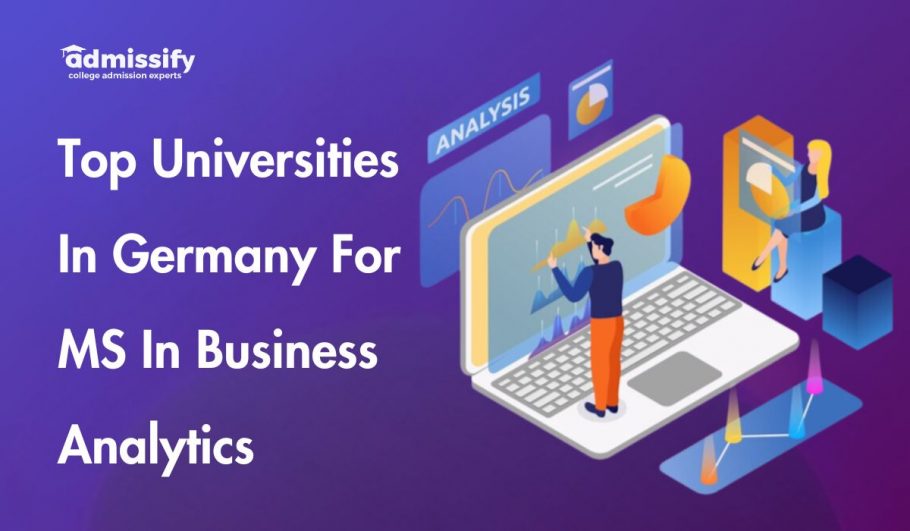Last Updated on December 13, 2024
Business analytics in Germany is a 1 to 3-year program for advanced knowledge of the bachelor’s degree in Computer Science, Business Finance, Marketing Management, or any other equivalently similar degree. The study of business analytics gives you the knowledge of the company’s data to understand market trends, and risk management processes, and drive innovations to improve customer acquisition. Moreover, it includes the retention of strategies for the business. such understanding will need to work with the companies to hold them accountable for making informed decisions for the business. It can also help you to automate the processes and deliver better products to the customers.
Germany is home to some of the top universities in the world for a master’s in business analytics, which allows you to combine the right amount of information with practical training. As you move along with the course in the German universities, you will get detailed information that could help you get career and announcement opportunities. In this blog post, we will discuss everything about the top universities in Germany for MS in business analytics and your career.
Why Should You Study A Master In Business Analytics In Germany?
There are so many reasons for studying business analytics in Germany but at the same time, you must know that Germany is a country with a model of new technology that has proven to be the better leader in the field of business analytics.
Here are the top reasons below for studying in Germany:
- The tuition fees at the German University are very low and even you can study for a degree at the public universities in Germany.
- As compared to many other nations and foreign countries, the cost of living in Germany is low.
- The courses at the universities in Germany are combined with knowledge and practical training, which helps you get hands-on experience.
- On a German student visa, you will be allowed to work a total of 120 full days or 240 half days per year.
- Even though there are many scholarships available for international students and for in-state students to complete their education.
| Degree Types | MS in Business Analytics |
| Course Duration | 1-2 years |
| Program Types | Full-Time |
| Admission requirements | Bachelor’s degree in subjects such as business, finance, computer science, marketing, management, or any similar field | Statement of Purpose (SOP) | Updated Resume/CV | 2-3 LORs |
| Language Proficiency | IELTS: 6.5 | TOEFL: 80 | DSH Level-2 |
| Tuition Fee | 8,000-22,000 EUR (6.95 lakhs to 19.11 lakhs INR) |
| Average Salary | 51,000 EUR (44 lakhs INR) |
| Top Employers | Amazon, Big Point, Trivago, Zalando |

Top Universities In Germany For MS In Business Analytics
You might be confused about the popular MS in business analytics university in Germany. For your benefit, we have provided a list of the best universities for MS in business analytics in Germany, given below:
- Humboldt University Of Berlin
The Humboldt University of Berlin offers you a 2-year Master’s in Business Analytics & Predictive Modeling. The university is also known for its strong academic foundation and global recognition.
| University | Duration | Course |
| Humboldt University of Berlin | 2 years (Full Time) | Masters in Business Analytics & Predictive Modelling |
- GISMA Business School, Hannover
GISMA Business School, Hannover provides you with a 12-month MSc in Business Intelligence and Analytics. Moreover, the courses are focused on practical skills and industry relevance.
| University | Duration | Course |
| GISMA Business School, Hannover: | 12 months (Full Time) | MSc Business Intelligence and Analytics |
- International School of Management, Dortmund
International School of Management, Dortmund Offers a 2-year M.Sc. in Business Intelligence & Data Science. The courses are designed to emphasize both theory and hands-on experience.
| University | Duration | Course |
| International School of Management, Dortmund: | 2 years (Full Time) | M.Sc. in Business Intelligence & Data Science |
- SRH HAMBURG:
SRH Hamburg provides a 2-year M.Sc. in Digital Transformation Management – Business Analytics. Even the combined business and technology expertise can be availed from the university.
| University | Duration | Course |
| SRH Hamburg | 2 years (Full Time) | M.Sc. in Digital Transformation Management – Business Analytics |
- SRH NORTH RHINE – WESTPHALIA, HAMM
SRH NORTH RHINE-WESTPHALIA, HAMM Offers a 3-year BSc in Business Analytics. This course helps you to get a comprehensive understanding of analytics and business fundamentals.
| University | Duration | Course |
| SRH North Rhine-Westphalia, Hamm: | 3 years (Full Time) | BSc Business Analytics |
What Are The Eligibility Criteria For Masters In Business Analytics In Germany?
The basic eligibility criteria that you will be required to meet for completing a master’s in business analytics in Germany is that you need to apply for a master’s program in business analytics in Germany. You must hold an accepted bachelor’s degree in computer science, statistics, engineering, economics, or a related discipline. Ideally, you should have a GPA of at least 3.0.
As a requirement for admission, several technical universities may have students do an internship. This is case-specific and not applicable to all German universities, though. If you want to guarantee yourself a spot at a prestigious German institution, you should focus on enhancing your academic record.
What Are Documents Needed In Germany For Business Analytics Course?
There are so many documents that you will be required to get admission to the top universities in Germany. Here is the list of the documents:
- CV with a copy of the certificate and the grades from each pre-study lecture
- Motivational writing [Letter of Recommendation (LOR) or Statement of Purpose (SOP)]
- An example of a statement of purpose (SOP) for admission to the MS in Business Analytics Essays
- GMAT or GRE results (optional)
- Evidence of proficiency in German (optional)
- Tests of English proficiency (optional)
- TOEFL PTE IELTS
How To Apply For MS In Business Analytics In Germany?
In Germany, admissions to universities are either rolling or have set deadlines. Applicants seeking information about the German university admissions procedure because there are a lot of requirements, applicants to German colleges offering MS in Business Analytics are encouraged to submit their applications as soon as possible.
Some of the requirements that are part of the admissions process include preparing your academic profile, organizing your credentials, arranging funds, applying for scholarships, and taking English proficiency exams. You can also check the official website to know the latest updates about the admission forms and the things that are required to submit in the application process.
Which to Choose: Business Analytics vs MS in Data Science?
Confused between Business Analytics and Data Science? Here’s a comparison to help you decide:
| Data Science | Business Analytics |
| Focuses on data analysis using statistics, algorithms, and tech | Concerned with statistical analysis of business data |
| Requires strong coding skills | Requires basic coding skills |
| Findings from Data Science aren’t always directly usable for daily business decisions | Business Analytics often informs key managerial decisions |
| Addresses broad, less specific questions | Answers specific business queries, often financial |
| Uses both structured and unstructured data | Primarily uses structured data |
| Is advancing rapidly with Machine Learning and AI | Has yet to fully explore artificial intelligence |
| Depends heavily on data availability | Less dependent on data availability |
Jobs With An MS In Business Analytics
The jobs that you can opt for after completing the MS in business analytics are as follows:
- Data Scientist Who Works with big data chunk analysis and data mining.
- Data analysts usually Develop methods and instruments to comprehend intricate data models
- pricing and revenue analysts help to enhance revenue by examining the company’s financial records.
- An analyst of operations research assists in locating and resolving operational issues.
- Business executives receive assistance from Business Intelligence Analysts in making data-driven choices.
- Additionally, you can choose to work as a Big Data Analytics Specialist, Management Consulting Analyst, and Market Research Analyst.
Overall, in the future, there is anticipated growth in the MS in Business Analytics degree.
Cost Of Living In Germany
The cost of studying MS in business analytics in Germany is important to consider, as you should know how much would be required to pay.
The table given below explains in detail the cost of living in Germany:
| Description | Amount (EUR) | Amount (INR) |
| Tuition Fees (Public Universities) | €0 | ₹0 |
| Tuition Fees (Private Universities) | €11,000 – €17,000 | ₹9,17,763 – ₹14,20,315 |
| Semester Fee (Public Universities) | €150 – €300 | ₹12,538 – ₹25,076 |
| Blocked Account (Yearly) | €10,332 | ₹8,62,289 |
| Blocked Account (Monthly) | €861 | ₹71,857 |
| Cost of Living (Yearly) | Approximately €10,332 | Approximately ₹8,62,289 |
| Cost of Living (Monthly) | Approximately €861 | Approximately ₹71,857 |
Conclusion
Top universities in Germany offer MS in Business Analytics programs, combining information and practical training. These programs provide knowledge in computer science, business finance, marketing management, and related disciplines. Eligibility criteria include a bachelor’s degree, a GPA of at least 3.0, and an interest in data analysis. The cost of living in Germany varies based on university type and student number. Jobs in business analytics include data scientist, data analyst, pricing and revenue analyst, and operations research analyst. Moreover, consult the team of Admission in case you have queries they will help you to sort things out.
FAQs
Why study MS in Business Analytics in Germany?
Germany offers the best world class education which focuses on practical skills. The country’s strong economy and technological advancements create a vibrant environment for Business Analytics studies.
Are German universities affordable for MS in Business Analytics?
Public universities in Germany offer free education for international students. Whereas, private universities have fees ranging from €11,000 to €17,000 per year, making it cost effective compared to other countries.
What are the entry requirements for an MS in Business Analytics in Germany?
Typically, you will be required to need a Bachelor’s degree certificate along with an English language proficiency (IELTS 6.5-7.5, TOEFL 88-100). You might be asked for the scorecard of some of the entrance exams such as the GRE/GMAT (GRE 300+, GMAT 600+). Additionally, a valid passport with a student visa.
How competitive is the job market in Business Analytics from Germany?
With Germany being a hub for innovation and industry, graduates have access to numerous job opportunities., you can choose to be a part of Data Analyst, Business Intelligence Analyst, or Scientist is in high demand, offering competitive salaries.

Kanishka Garg specializes in crafting informative content on study abroad education. Her passion lies in simplifying the journey for students through SEO-optimized articles and blogs. Kanishka’s commitment to clear communication and her deep understanding of international admissions processes make her blogs essential for students aiming to gain insights into top universities worldwide. With Kanishka’s blogs, students can confidently get solutions to the complexities of applying to their dream universities and achieve their academic aspirations abroad.




